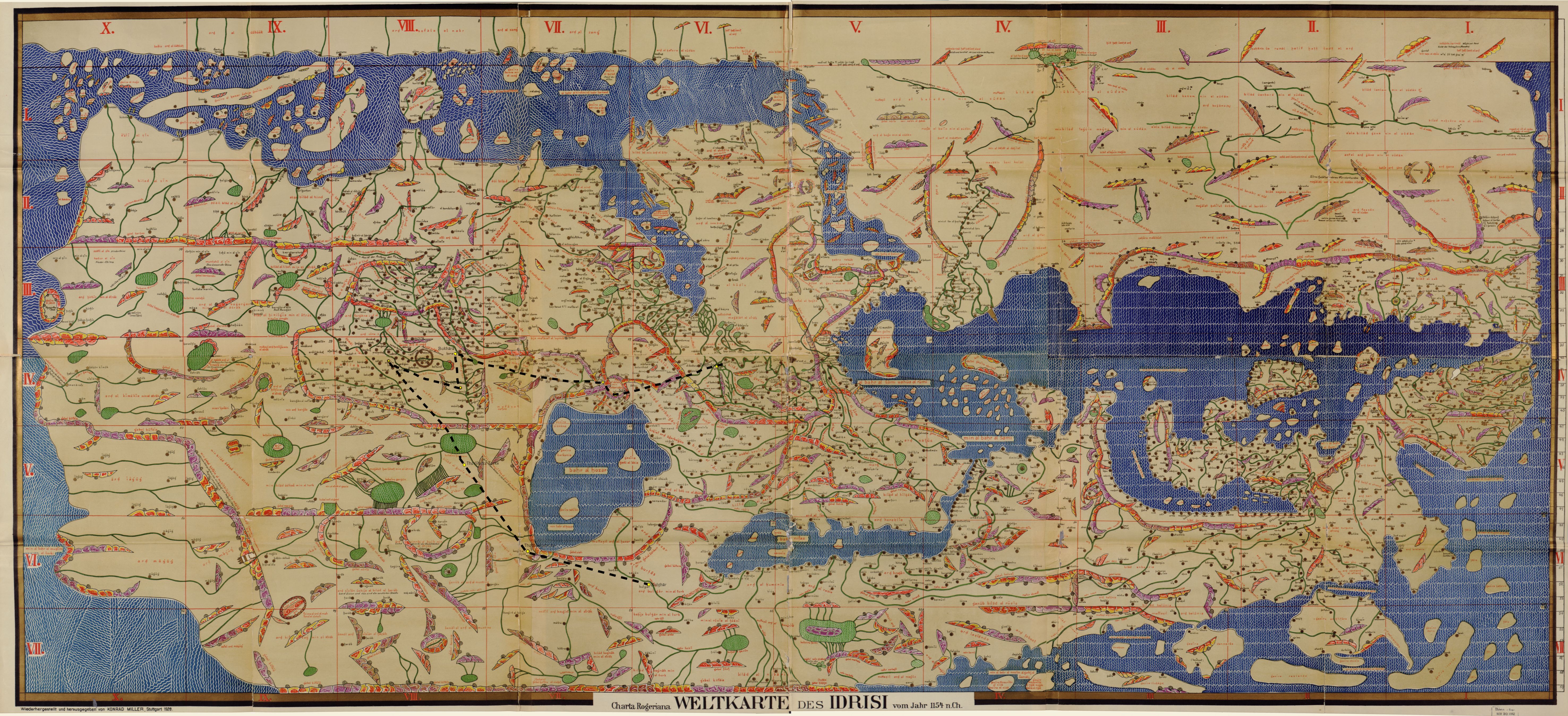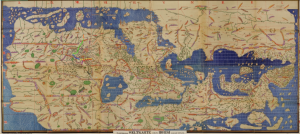
Category: Ibn Fadlan (Page 5 of 7)

Nahrawan to Sawa (orange); Sawa to Simnan (green); Simnan to Danaghan (blue); Danaghan to Sarakhs (yellow); Sarakhs to Marw (red); Marw to Bukhara (purple); Bukhara to Khwarazn (brown); Khwarazn to Jurjaniya (black); Jurjaniya to Bulghar (grey)
Ibn Fadlan does not decisively say precisely when he enters Bulghar, but he does relate the crossing of many rivers on his journey there, after which he tells of how he interacts with the King of the X. He recounts his failure to deliver the money his journey was intended to do, reminding the reader that he had “warned [his companions] about this [situation]” (29).
Ibn Fadlan also describes the northern lights, which he counts as one of “uncounted marvels”(31). He is also struck by the people’s relationship with the vast number of snakes in the area, which he recounts as “twisted about…tree[s]” but emphasizes that they “do no harm” (33). Ibn Fadlan also describes evergreen trees, saying how they are “narrow leaves like palms, but grouped together,” commenting on how the “trunk is leafless.” (34).
Most troublesome to him, however, is the shortness of the nights, which make for a difficult prayer routine. He relates the tale of the muezzin, who says that “a month earlier, he had not slept at night, for fear of missing the dawn prayer” (32). The varying lengths of day and night create an obvious strain on the Muslim prayer rituals, which is reflected in this passage of ibn Fadlan’s travel narrative.
In Bulghar, ibn Fadlan also encounters the Rūs, or, as we know them today, the Vikings, who travel down the River Itil for trading purposes. Interestingly, ibn Fadlan says that he has “never seen bodies more perfect than theirs” while also describing them as the “filthiest of God’s creatures” (45, 46). This apparent contradiction of beauty within filthy disgustingness indicates that hygiene and appearance are utterly distinct and separated from the idea of the “perfect body.” Unlike today, beauty and cleanliness were not nearly as closely associated in ibn Fadlan’s time as this description on the Rūs demonstrates.
In addition to describing their lack of hygienic habits, mainly the absence of ritual washing, ibn Fadlan juxtaposes the “filthi[ness]” of the Rūs with their habit of public sex with slave girls. Ibn Fadlan writes that when “slave girls’ are on sale for the merchants at Bulghar, “each of the men has sex with his slave, while his companions look on. Sometimes a whole group of them gather together in this way, in full view of one another. If a merchange enters at this moment to buy a young slave girl from one of the men and finds him having sex with her, the man does not get up off her until he has satisfied himself” (47). This passage immediately follows ibn Fadlan’s observations around the filthiness of the Rūs, implying that their public sex is a part of or, at the very least, related to their filthiness.
This perception is very much in line with ibn Fadlan’s previous observations and outrage at women bearing their genitals, however, in describing the Rūs, the Arabic traveller takes on a more neutral, objective tone. Perhaps the habits and customs of the Rūs are so astonishing that ibn Fadlan feels that the facts alone speak for themselves, in the eyes of a Muslim audience, or perhaps ibn Fadlan respects the Rūs for their strength and beauty, counteracting his previous judgmental writing on other non-Muslim communities. Either way, there is something about the Rūs that captivates ibn Fadlan and consumes a significant portion of his travel narrative, reflecting his interest in other cultures and people.
When Ibn Fadlan reaches Khwarazm, he first describes the weather. It is incredibly cold because of winter, which he admits to being warned about, and yet he still travels to the city of Khawarzm via boat. In fact, he writes, “it was impossible to travel all day because of the intense cold,” (6).
Once he arrives in Khwarazm, Ibn Fadlan goes directly to see the ruler of the “town, the Khwarazm Shah Muhammad ibn ‘Iraq,” who lodges him in a house (7). Three days later, Ibn Fadlan is “summoned” to discuss his intent to visit the land of the Turks, which Ibn ‘Iraq is strictly against and refuses Ibn Fadlan permission. He claims that “this is all a trick” and that “between the country of which you speak and where you are now, there are a thousand tribes of unbelievers,” (7). Ibn Fadlan continues to request permission to continue, which eventually, Ibn ‘Iraq grants, however reluctantly.
While still on the topic of Khwarazm, Ibn Fadlan briefly mentions the monetary systems of the city as well as the language, which he describes as sounding like “the cries of starlings” as well as the language of a nearby village in which ‘their speech sounds exactly like the croaking of frogs,” (8). Ibn Fadlan also finds it prudent to mention that these people “deny the legitimacy of the Commander of the Faithful…at the end of each prayer” (8).
The tie between religion and safety is evident in this passage, particularly in the statement of Ibn ‘Iraq when he warns Ibn Fadlan of the “thousand tribes of unbelievers” he would have to travail in order to continue his journey. The juxtaposition of Ibn Fadlan’s journey as a “trick” paired with the statement and reasoning that he cannot continue because of these “unbelievers” suggests that there is danger in passing through a territory of non-Muslims, especially for a Muslim traveler such as Ibn Fadlan. This also implies that there is an assumed level of safety guaranteed by passing through Muslim territory. Not only does this statement on behalf of the ruler of Khwarazm signify unity and cohesion within the Islamic Empire, but it also illustrates the fear of other, non-Muslim religions. The view of the “unbelievers” is rooted in both a fear of those not like themselves as well as a degraded, prejudiced view of those who are not Muslim. Though we later learn that Ibn Fadlan fares well in the land of the Turks, both Ghuzz and Bashghird, there is the underlying sense of fear and judgment that he carries with him, based almost exclusively on religious practices and cultural differences that directly or indirectly oppose those of Islam.
Ironically, though, Ibn Fadlan likens the language of the Khwarazm people to the sounds of animals, both starlings and frogs, displaying a degree of disrespect for them, despite the presumed alliance between himself and their ruler. He describes them as “the most barbarous of people, both in speech and customs,” and although we do get a description of what he finds so “barbarous” in their speech, he gives us no hints towards customs, so one can only imagine that he is referring to their denial of “the legitimacy of the Commander of the Faithful…at the end of each prayer,” (7, 8). This perception would fall in line with Ibn Fadlan’s trend of disregarding people who do not practice the same rites that he hold dear, and even a small difference such as this leads him to label them as “barbarous.”
While in Bulghar, Abu Hamid again focuses on some basic aspects of the city, like the climate of the area and how it affects everything. He first points out that it is mostly built from pine and oak wood, and that it is densely populated with people. He later goes on to say that during the winter, their nights are very long, while the days are short, but during the summer the days are much longer and “hotter than anywhere else in the world,” (66). Some of the interesting things that he focuses on about the weather is how cold it is, and because of the temperature, the ground is almost impossible to dig. Due to the frozen ground, Hamid mentions that he had to wait six months to bury his son, who has died while in the city. He also comments that “the body of the dead are frozen as hard as stone,” (67). Another interesting thing is that during the summer, he says it is also difficult to practice Ramadan and fast in the city because it is so hot. Because of this he then had to “give up and take refuge underground in a room where there was a spring,” (67). Hamid’s focus on the weather seems to be the only negative thing that he has said about the entire city, as the rest of his observations are as he did them before—pure observations with hints of awe at certain features of the city, like the food.
Going back to his normal observations, Hamid then goes on to say that the people are able to survive such a harsh winter is because most of their food and drinks contain honey in it—which he says is very cheap in that area. He also talks about things like finding the bones of the people of Ad and mammoth ivory, as well as the beaver that populates the area near the rivers, and the Aru people that sell the pelts near the city. He focuses a bit on these kinds of observations—things like the beaver and giant birds, imported items like the sword and what they’re sometimes traded for, and the sky.
With all these observations, I believe he continued to express some form of admiration, and again seems to just be taking everything in objectively in most cases. Apart from his comments on the weather that focused on some of the negatives of both extreme seasons, Hamid does not seems to do this with any of the other subjects that he talks about. Even his weather observations barely contained any true harsh language, as Hamid did not outright make any personal affronts apart from pointing out the obvious—the ground was frozen during the winter, and it was too hot to practice Ramadan during the summer. His admiration for everything else however, is made apparent through his long passages focusing on the more basic things, as well as his positive language like, “the beaver is a wonderful animal,” (69). Again, I believe his purpose is to just highlight certain aspects of the city, and learn more about them in an objective manner.